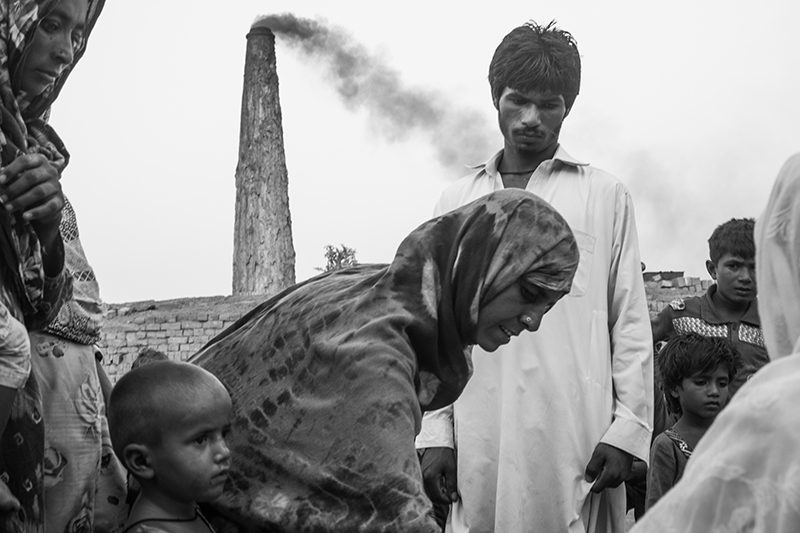
The Past that Couldn’t be
BY Ramis Abbas
MENTORS: Mahesh Shantaram & Shah Zaman Baloch
PAKISTAN PHOTO FESTIVAL FELLOWSHIP 2017 PROJECT
In the 1980s, however, student unions were banned in Pakistan by the Zia regime. Perhaps it was expected by the government that such a legislation would put an end to all sorts of political unionization among students, as it claimed that by the removal of student unions would eradicate the violence in and outside the campus.
The Past that Couldn’t be
It would not be easy today for a student in Pakistan to imagine a kind of campus where students have a collective, consolidated and legal political space. This was how the public-sector universities were before the 1980s. At that time, students were not a disassociated group having no political imagination of any sort. They were rather a unionized and organized collective having a profound influence on politics in and outside the campus. Their political engagement ranged from having a legal right to have a say in university policies to being a potential political partner of the organized labor. Students comprised the foundation of the movement against the dictatorship of Ayub Khan. Unions like Democratic Students Federation (DSF), National Students Federation (NSF), Islami Jamiat-e-Tulba (IJT), All Pakistan Mutahhida Students Organization (APMSO), etc. were a constant presence on campus. Interestingly in educational institutions today, students cannot even imagine a campus where their consent is necessary for any policy to be implemented by the university.
In the 1980s, however, student unions were banned in Pakistan by the Zia regime. Perhaps it was expected by the government that such a legislation would put an end to all sorts of political unionization among students, as it claimed that by the removal of student unions would eradicate the violence in and outside the campus. The progressive element of the society saw the legislation as an attack on fundamental human freedom and many believed it to be Zia’s attempt at silencing a politically charged student base to speak or act against his rule.
It, unfortunately, hasn’t turned out as planned by the government at that time. Campuses in the country have continued to be politically mobilized by organizations like the Islami Jamiat-e-Tulba (IJT) who, some believe, and rightfully so, had the state behind them through every endeavor. Even in the recent past we have seen various clashes among ethnic, religious and political student groups on the issues of culture, religion, race, etc. There was an attempt by the PPP administration under Benazir Bhutto to revive student unionization but the decision was nullified by a Supreme Court ruling in 1993. This means that students now get admission in universities under a legal pledge to not participate in a political activity of any kind if they are an enrolled student. A recent resolution passed by the Senate in favor of reinstating student unions offers a glimmer of hope to the proponents and advocates of student politics.
What has aroused curiosity in me in the current realm of affairs is the recent rise of the politics of the left in this scenario. The left in Pakistan has always followed an interesting trajectory. It managed to put up a potential rise in the wake of the socialist dream of the 60s, but other than that, the right and center have dominated the political landscape of Pakistan. After the fall of the Soviet Union, the left, as they said, had been done and dusted. There was no major influence of the left on the politics of the 90s and the 2000s. But now we see another attempt to rejoin the political sphere. Old organizations such as the DSF and the NSF are trying to have another go while newer groups like Democratic Students’ Alliance (DSA) and Progressive Students Collective (PSC) are also trying to become an influential entity in the political and educational landscape.
I had a few acquaintances in the circles where students wished to pursue what they called the politics of the alternative. They arranged reading groups, seminars, street theatres, etc. which were aimed at building an alternate analysis of the contemporary socio-political situation. The reception of their work is, of course, not too high since their mode of politics is considered
to be outdated. It is as if the primary task, as of now, is not to build a national level movement against the system. It is to try and recapture a space where alternative political discourse and practice can be entertained.
I, however, saw this opportunity to see how the left is trying to build its revival and to record the experience of the old and the new students. This marked the start of a journey of documenting the activities of students who are trying to revive of speaking the truth out loud, as it is. A documentation of a different species in a desperate search of those of their kind.
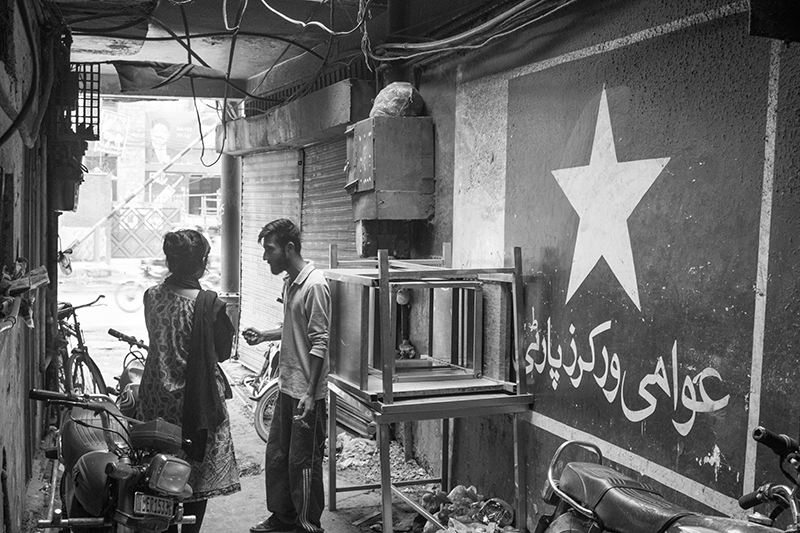

Mirza Muhammad Ibrahim Mazdoor Tulba Mela
It was in April that I attended an event by these students for the first time. I was let known by an old friend, who was one of these students, that they were organizing an event with a collaboration of the Railway Workers’ Union. The Railway Workers’ Union is said to be the mother of unions in Pakistan, he told me. The students wanted to explore the possibilities of reviving the age-old alliance between workers and the students, a political tradition that yielded historical results in several progressive movement around the globe. The event was called the Mirza Muhammad Ibrahim Mazdoor-Tulba Mela. It was also being organized to commemorate the memory of Mirza Muhammad Ibrahim, one of the most radical and significant railway unionists in the history of the sub-continent. He was also the founder of the trade union movement in India and Pakistan and he also founded the Railway Workers’ Union, which is the oldest union in Pakistan. It was being organized at the Railway Headquarters, Lahore. There were students as well as various old unionists and leftist politicians who are referred to by the younger lot as “babay” (the old men). The students organizing this event were a part of the Progressive Students’ Collective. The PSC is a recently formed student organization that aims to mobilize students for the betterment of educational conditions on campus. Students from various campuses across Lahore such as Government College University, Forman Christian College, University of the Punjab, etc. are a part of this organization. The event included speeches from various members of the railway union as well as the students. The PSC and Sangat, a local theatre company, also performed their theatrical pieces which left a deep impact on the audience.
Reading Fanon Under a Tree
The first academic activity I attended was a study circle at Nasir Bagh. This is also one of those activities which are not one-time events. The study circles are meant to be held on a regular basis to let the intellectual capacity of the group keep up with the practical. The circle I attended was a part of a weekly radical seminar series which was aimed at arranging lectures to understand some monumental texts of the core radical philosophy. Hegel, Fanon, Deleuze, Foucault, Marx, Badiou, all of them were discussed under the shade of a tree. The two circle I attended were led by Mr. Shehzad Amjad, a professor of philosophy at Beaconhouse National University, Lahore.
The two lectures were on on “Natural and Social Philosophy: Fanon and Political Will” and “Being and Event: Alain Badiou”. The lectures on Fanon was explained with a brilliantly put relevance with the kind of structures we find ourselves in. It took everyone, just like Fanon arguably would have wanted, to a voyage back into the past, critically evaluating the political and socio-economic evolution that gave the society the shape and nature which persists today, along with the consciousness consequently produced as an outcome. This was complemented by an equally deep insight into the need and possible ways to build a resistance that personifies of the political will. It was in this lecture that I got an idea of the name I could give to this project as Shehzad Amjad said, in a manner that reflected his brilliant oratory skills, “The past isn’t only what happened. It is also, what you could have been.” This also helped me in naming this project. To look into a past that could have happened.

By far, these were two of the best experiences of my life. These circles were built on two principles you don’t get to see much in public educational institutions today: students taking an initiative for themselves, and professors discussing philosophy in a way it should be. I don’t see such intense politics discourse in many campuses today, perhaps one of the reasons why the educational quality has died down. What you see in public institutions is a learning environment exactly opposite to this. Firstly, you don’t see any real philosophy being taught, and if we get lucky to find something like this being imparted, you see teachers lacking intellectual content to an extent that the student never gets to understand and rationalize the text. This is the reason why it wasn’t difficult to witness seeds of a new alternative thought in such gatherings. The lectures had a deep political relevance, were built upon a constructive critique of the system and were brilliantly delivered.
It was after these circles that I realized the need to go in and talk to these students individually to identify what their view of the world is. I met them at seminars, campuses, hostels, etc. and talked to them about not only their grievances with the status quo but also about the kind of society they wish to live in. It helped me in seeing through the conditions that make them indulge in political activity. I had seen, to some extent, the work they are trying to do. The question now was to see what had driven to be where they are.

Yusuf Baloch
It was after this that I met one of the most senior activists working in the left these days. Mr. Yousf Baloch, an 80 years old activist, who has been a part of the network for nearly 55 years. I first saw him at an event on the issue of Khaadi workers’ plight. I approached him for exchanging a few words and he invited me to his place in Misri Shah. I crossed the Do Moriya Pul on my bike and went all the way to Misri Shah to his home. I was standing at the corner of the street where he lived when I asked people where his home was but no one knew that he lived there. I finally found his place. We both went in and the first thing he said to me was that he wasn’t expecting me to be there because he felt that people don’t bother these days. He told me history of Misri Shah and the people who live there. It wasn’t boring at all for someone who had no prior knowledge of the place because all stories were coming up from a progressive perspective. His room had a bed and a collection of books and trophies. We talked about films and music of Pakistan because Nanna, Rangella, Abid Kashmiri, Aziz Mirithi, Qateel Shifai, SM & Aslam Dar used to live in Misri Shah and he was friends with all of them. He told me that the people of his area mostly pledge their allegiance to PML-N. “But when I give them logic, whenever I do, they ask, “Who told you that?” to which I say, “Books!”” I also met his wife and she offered me a cup of tea.
Baloch Sahab joined the railway after his intermediate and was inspired by Mirza M. Ibrahim. He later developed a disagreement with him when he disallowed youngsters to speak at processions and registered a separate union where professors initiated study circles on the teachings of Marx, Lenin, Mao, etc. Yousaf sahib faced intense coercion from the authorities throughout his career. He was put under house arrest in 1975 under the regime of PPP, and was told that his life was in danger. He was kept in chakki no. 4, where Bhutto was kept and also at a mosque for a few days. Later in the Zia-ul-Haq regime, he was arrested for organizing a funeral prayer for Bhutto. He and his comrades were arrested and later asked for money by Major Zafar Shareef. Rs. 500,000 was the price, which was later reduced to Rs. 50,000 when they realized that they were workers. He later on to work in CBA in various capacities and is still a senior member of the leftist circles.
Yousaf sahib believes that for students to work, knowledge of the societal structure is necessary along with a solid relationship with the working class. He thinks that students should visit factories, arrange lectures and study circles, and get lectures themselves from the people belonging to the working class. “Mao Tse-Tung said that the middle class will betray you when you talk about revolution. I can only see truth in this statement. The revolutionary class will always be the working class. He has problems in his life but you should not let him get in despair. You should give them knowledge,” he said. He further argued that the students should understand the class structure of their society in order to understand what kind of politics they need.
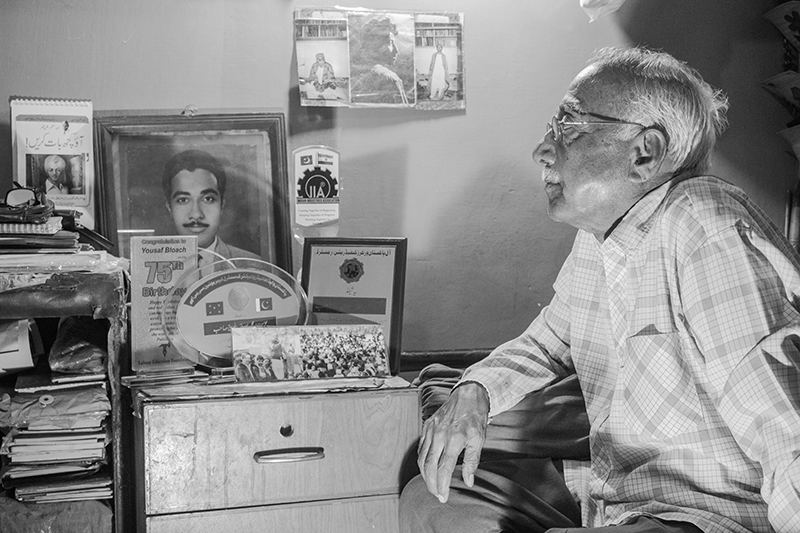

The party should be organized first and then it should be run with peace. He also believed that they should fight in elections. “This is not the times of Lenin or Mao. Maybe you’ll fail the first time but you’ll win the next time. Then you can have a chance to apply your politics.” He further said that the youngsters are a little allergic to the old people. They should listen to them and remember that those who died for this cause never made properties. They made students, workers and activists who want a good society for everyone.
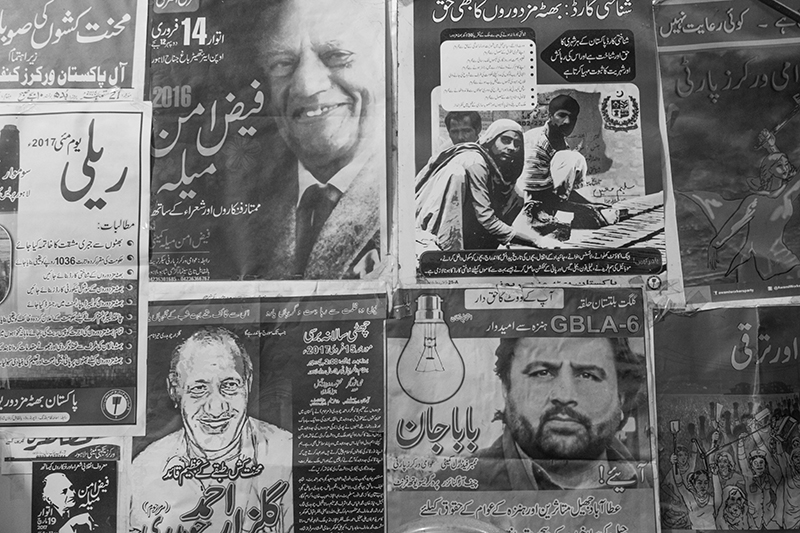

Farooq Tariq
I first met the Spokesperson of the Awami Workers’ Party, Mr. Farooq Tariq. I never got to know about Farooq Sahab as much as others. From what I perceived, he was a man who spearheaded in conducting meetings, engaging with people and organizing events. I interviewed him at the desk where he sits usually.
He started politics in the time of Ayub Khan and was a part of the student movement that resisted his regime. He participated in the 1976 Peasant Movement as a volunteer. After his intermediate, he went on to study at the Islamia College, Civil Lines, Lahore and was elected the President of the Psychology Association there. He did his masters from Punjab University where he was up against the Islami Jamiat-e-Talaba. He narrates that his time at Punjab University was filled with political excitement, hostility and sometimes violence whereby his office was attacked by renowned Jamiat leaders like Liaquat Baloch. Throughout his political career, he has worked with the Inquilabi Mahaz-e-Talaba, Mazdoor Kissan Party, National Student Federation, Internattional Marxist Tendency, Weekly Alfalah Magazine, etc. He then went to exile in Amsterdam in 1978 but continued working there as well. Currently, he resides in Lahore.
When asked about his opinion on the work PSC is doing, he termed their endeavors as classical. He said that he hadn’t seen the students make a mistake throughout the work they have done. ”They are taking up issues in a militant way and not indulging in adventurism,” he told. He said that he was also arrested 12 times in the Musharraf era, but the good thing about these students is that they are working according to the socio-political realities. The students have continually increased their outreach by using technology platform. “The babay (old men) think that they are 100% correct and they want to advise and control these students. I say that the students should be the ones in control of us,” he remarked. He also said that another good thing about the organization is that it is forming links with the trade union and that a solid relationship with the working class is the only way forward. The public space is shrinking and with it the freedom to speak. The realities are difficult but it doesn’t take long for the times to change. “These students listen to everyone, express themselves and work. You can their work in the Khaadi movement.”


Mahmood Butt
The last “baba” I met was Mahmood Butt Sahab. He is known for his deadly work in his circle. He does all the field work and has a lot of experience in it. I found him more like a practical guy rather than intellectual. When I interviewed him, he talked to me in very detailed manner. This meant that sometimes we got off the topic which was good for me personally, but not for my documentation. What happened then was that as we talked about people working at the Bhatta (brick kiln) and their environment, I decided to go to his Bhatta and see what kind of politics he is trying to pursue. I went near Wahga with my Friend on a bike. I found him to have great leadership qualities amongst the workers which I didn’t expect by observing him in office meetings. He was way more confident in that heat than in office.
Butt Sahab started politics as a child labour student activist in the era of PPP and is currently working as the General Secretary of the Bhatta Mazdoor Union of Punjab. He initially started working as a motor mechanic and later on worked for Ittefaq foundary, in the absence of any labor laws to protect the labourers. He joined the trade union in 1988. The union was called People Inquilabi Union. He was tortured in 1994 by the sons of Barkat Sharif following the union’s streak of pressurizing and closing factories to ensure that workers get their wages. The union filed cases at NRIC but nothing happened. In this time, he was also introduced to the Jadojehed party and met the likes of Farooq Tariq, Dr. Amjad Javedpuria. He later on served as the Vice Chairman Lahore in the Labor Party. In 2002, he started Pakistan Bhatta Union which was not registered even Supreme Court and Sharia Court had ruled in favor of them. Thus, the union was registered at Punjab Level and he is still working there.
What makes Mahmood Sahab special in all this discussion is the fact that he, in his young days, was a Bhatta worker himself. Now he serves as the General Secretary of the union. “This slavery is spread over generation. You can see both the traditional and modern face of oppression here. The workers watch TV, use mobile phones, but there are no toilets for them, they don’t have houses, schools or a reasonable salary. One can’t even stand in these houses. The owners still have the old behavior: they think they are the owners of humanity,” Mahmood Sahab said. He has participated in major movements for the empowerment and improvement of working conditions. His struggle has helped the workers get their identity cards, to reduce torture, and to improve the consciousness of the skilled Bhatta worker that, he believes, can’t be found everywhere and has a special value in the market. He also shared a special detail regarding the Bhatta worker and his financial conditions. He told, “In Bhai Pheru, the worker was only given a slip of Rs. 300. He used to show the slip to the shop to get the necessary things to go home, cook and eat. This still happens. He was, moreover, made to work for special bricks. He deserved a daily wage of around Rs. 3900 but only had to survive on the Rs. 300 slip. The worker never even got to see money, let alone using it. This is the kind of oppression that we have tried to fight.”
He further said that after the fall of Soviet Union, politics for the workers has become more difficult which requires the student to take active part in reviving it. “There is a lot of despair in this work. The trade union tried to encourage more people to join and work with them. There is a gap of 20-25 years in the politics of the left. The new blood needs to join,” he remarked.


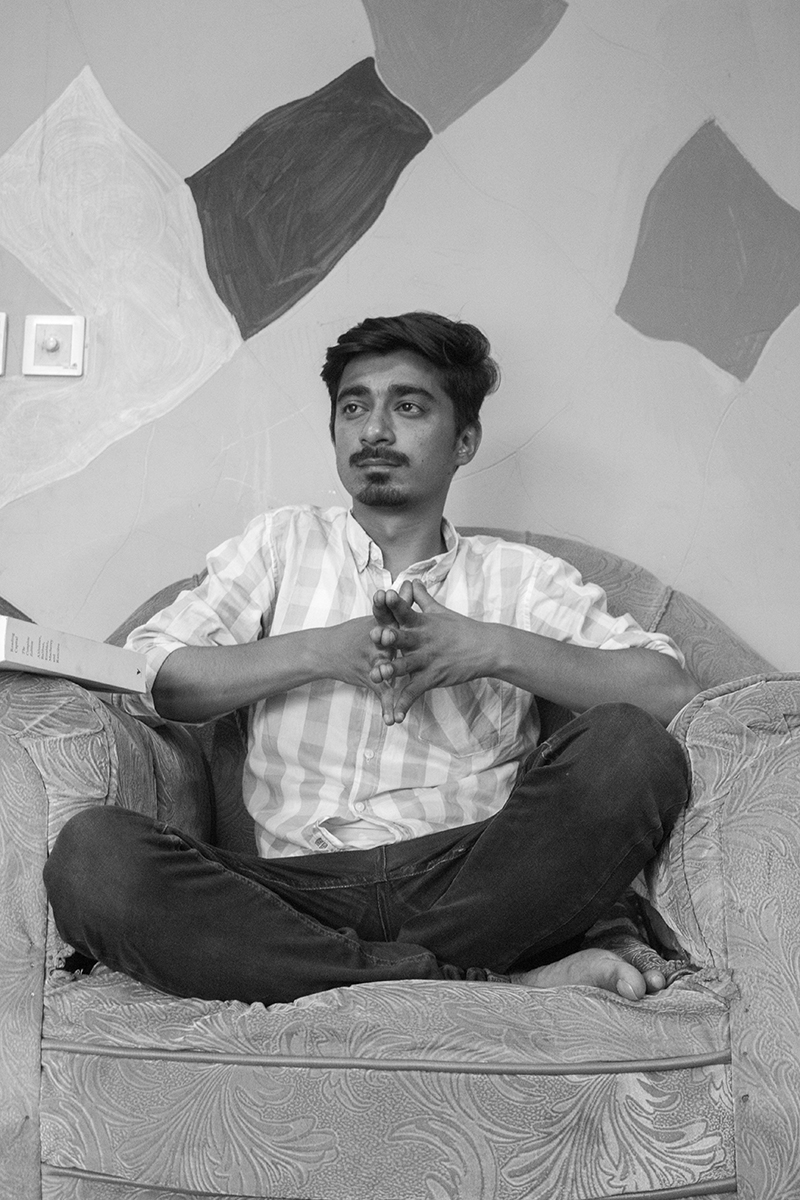
Zahid Ali
I then met Zahid Bhai, a senior member of the organization at Umair, another comrade’s place. He was very engaging and always ended up making good points related to the way the party should work. I thought of him as basically a bridge of the old and new left in this party. He also hosts meetings and events. Afterwards, I went to his place for an interview and it went quite normal and to the point. Nothing excited or exceptional happened.
He is a graduate from the Persian Department, GC University Lahore and was working as a Research Assistant in the Information Technology University, Lahore. He is also working with the People’s Solidarity Forum, a left-leaning forum that intends to work on climate issue, women empowerment, student and worker unionization, etc. He told that the Progressive Students’ Collective is currently a major project the forum is working on, which is an independent organization for student activism.
Zahid talked critically about the historical evolution the left had to go through and what it must do to revive its political relevance. He thought that the fall of Soviet Union gives us an impetus to rationalize the causes of the failure of the left. Today, the left must focus on the potential and principles that can create a newer kind of politics. The main question for Pakistan’s left is how it intends to become relevant with the people again. The conflicts of the past, of Stalinists, Trotskyists, Maoist are not of fundamental importance, and the problems of a common man must be prioritized. He quoted Zizek and said that the rise of fascism today finds its roots in the lack of left’s global strength. I asked him how he thought the left can revive itself.
“I think the main challenge is how you do your class struggle. We must connect all type of classes. Water is getting privatize, taxes are increasing, people are getting dispossessed from their houses. The earliest face of capitalism was exactly like this. The problem of informal labor, movement from rural to urban areas, issues of students and workers should all be catered under one cause, and we are trying to do it. This task demands a very dynamic type of organization. Its appearance should be open, center should be strong, it should be internally disciplined, and it should be dialectical in every way,” he said. He thought that the ultimate goal is still communism, but we must fight for the destruction of class, to reclaim the right to be seen and thought as a human, to tackle with environmental hazards, to reject male dominance. He also thought that we can only run such a society if there is a government who firmly believes in these ideals. He thought that the reasons behind the failure of the old left are their insecurity and reluctance to find for new ideas after the collapse of the Soviet Union, its inability to fight with its factionism, and its incapability to connect with the masses and eradicate the intoxication of the old Soviet Union dreams. Whoever will think beyond these issues will initiate a new politics. Army oppression, patriarchy, academic and factory issues will only be sorted out once we get out of our individual issues and build a culture of the left. Such a politics would be democratic and open ended. “We are not going to the masses to teach them something, we are going to them to learn and contribute. Every student is depoliticized which is unacceptable. You’re in this society and can’t back off from politics, no matter what!” he said.

Mudabbir Ali
Next, I had to go to a boys’ hostel in front of Karbala Gaam-e-Shah to meet Mudabbir Ali. The hostel had an apartment with multiple rooms. All boys living there belonged to Gilgit Baltistan. They have come all the way to Lahore to study at various institutions. They spend the day at campus but after the evening you could see them doing everything together. All of them knew how to cook and at dinner, everyone was there. There was seldom an exception. Their nights were usually filled with them talking, singing and dancing together. It was as if they had created a little home away from home.
I spent a lot of time with Mudabbir at his hostel. He’s also from Gilgit and I found him to be a very funny guy. Often I saw him making fun of his seniors, even though some of them resisted. But I thought that he’s not noticed as much as Haider. Haider and Mudabbir spent most of the time together. But I found the latter more amusing. So, there now existed a curiosity of photographing him and figuring out his real side and how he became an activist. Which I did, I guess. Mudabbir recently completed his final year at GC University Lahore. He was pursuing a bachelor’s degree in Political Science and is an active member of the Young Reformers, a student group in Gilgit Baltistan. He has been associated with Progressive Students’ Collective from the times the organization was created.
He told that the politics he wishes to pursue is the politics that connects the disengaged groups. “The activism we are doing intends to connect the workers with students, something that has been absent from the last twenty years. We have tried to create connections, meet them in their colonies, and arrange seminars. This is what I believe to be something that differentiate our struggle from others. Such a connection hasn’t been there in any recent progressive organization.” He also said that activities like study circles and seminars are intended to connect the politics to the ground realities by studying various intellectual works. It helps students academically as well as in their effort to relate their intellect with the contemporary world.
“We need to enhance our critical thinking since we get a specific environment in the classrooms. There are already understood boundaries and no one can dare to cross them. In study circles, you can question anything.” He also said that theatre, in the same sense, can be helpful since it creates an impact that leaves a lasting effect. “Whatever it is, be it theatre or study circle, our underlying principle is the same. We wish to talk about the marginalized and the oppressed classes. It has been wrongly affiliated with politics that everyone who does it is corrupt. We face this problem whenever we try to reach our people. We face such insecurities. It is something that we are trying to overcome.”
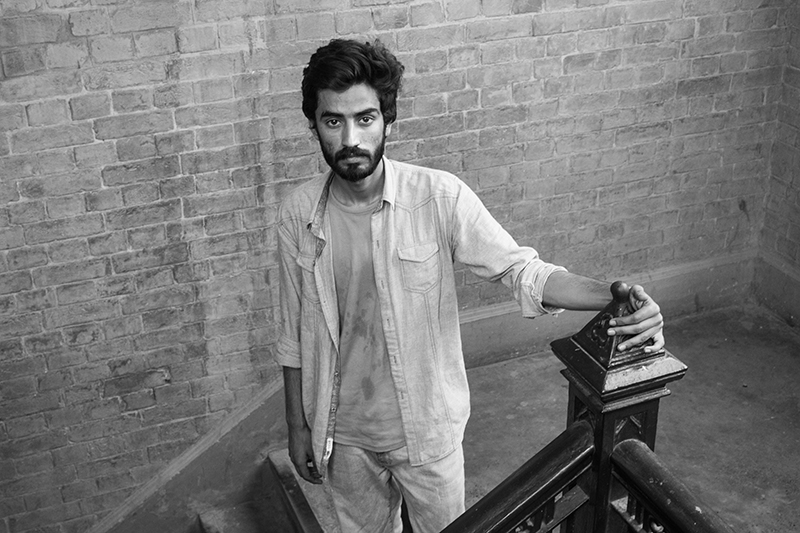

Bakhtiar Ahmed
The next student I met was Mr. Bakhtiar Ahmed, an intermediate student in GC University Lahore. He is a boarder who originally hails from Sargodha. I saw this young lad in a study circle and found him a bit distant from the activity, always silent in whatever he was doing. I was supposed to interview some women and he was sitting on the stairs 6 yards away from everybody. He had a handsfree in his ears. He was as present as always but not engaging with anyone. I approached him to talk about random things and I found out that he was the youngest activist of the group. We talked a lot about music, art and society. We discussed current situation of student psychology in society and on campus. He talked to me about the art and philosophy being produced these days, the need for resistance and the kind of depression an intermediate student goes through when he imagines the system he must struggle to be a part of.
He was very critical about art and thought that we live in a paradox whereby the art is being originated from within us and still is not able to represent us. This is because of our neo-colonial identity and the fact that a specific type of art is being propagated in order to strengthen the state narrative. “Some people write about feminism, against patriarchy, racism, sexism, etc. but it is still not being accepted since the popular art is being propagated by the state. This popular bourgeois art is racist, sexist, and it objectifies women,” he said. He believed that the fundamental thing is to have the right to resist and it only comes with the conscious realization that we are oppressed and subjugated. Therefore, the study circles are a way for us to realize and consequently evolve, just the way Marxist philosophy has evolved through such constant engagement. Failure, he thought, as Badiou writes, is not a wrong thing, since it only signifies that the work is ongoing.
Bakhtiar also talked about how the depression generated from the need for money and being productive has confined the minds of students of his likes. No one imagines an alternative way for productivity and everyone is, therefore, becoming passive day by day. Being successful is nothing but a coincidence since there are only a handful who, after a lifelong struggle, achieve what they desire. This was the reason why he thinks that resistance is the only way forward. “There is a probability that nothing will happen. So, what does that mean? Should we not fight or resist? Once we realize that there are problems, that we are being oppressed, that as individuals we have lost the humanity within us, don’t we get a right to fight back even if nothing comes out of it? We can at least satisfy our inner selves that we tried,” he thought.
